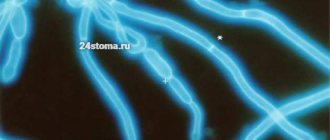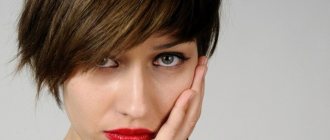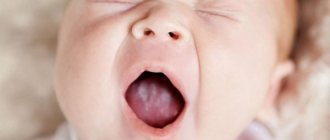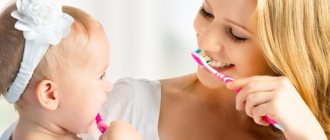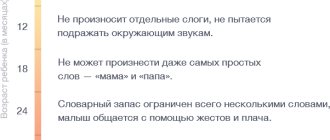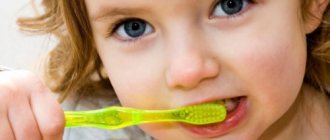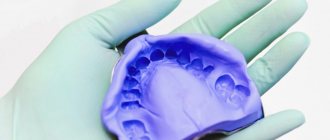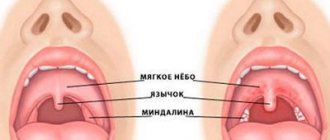Children under one year of age often experience increased activity of the salivary glands. This can be caused by various reasons: from teething to acute respiratory disease. The main thing is to correctly determine the cause of this condition. In most cases, this problem does not require treatment and goes away on its own.
Baby drooling is a common occurrence.
Causes of increased salivation at night
If a child chokes on saliva in his sleep, he should be moved from a position lying on his back to his side or stomach, then the mucus will not flow into the lungs, causing a cough. The problem is worse at night because:
- The baby lies on his back;
- The child does not move for a long time;
- Mucus drains into the lungs along the back of the throat;
- At night, the activity of the salivary glands increases.
This condition should not be considered a pathology; it is normal in children under one year of age.
The most common reason for the active formation of saliva is teething. Also, the volume of mucus secreted increases sharply when a child suffers from acute respiratory infections and acute respiratory viral infections. When the period of recovery begins, this condition passes. The baby begins to choke on saliva because mucus from the mouth constantly gets into the throat, and the baby does not have time to spit it out.
The most likely cause of the problem is active teething
Manifestations
Symptoms of hypersalivation in adults and children older than one year depend on the type of disease:
Dosage form
Most of the medications that a patient takes can cause moderate or severe xerostomia, a disease accompanied by dry mucous membranes. This phenomenon is observed during radiation or chemotherapy, during the treatment of cancer. Symptoms of hypersecretion of saliva occur after taking lithium and Nitrazepam. The problem can be eliminated after stopping the medication or reducing the dosage.
Psychogenic form
It occurs quite rarely in patients, and excessive salivation has no obvious cause, since there are no signs of brain damage. This form of the disease is very serious because it is difficult to diagnose, and the patient is forced to carry a container with him all the time to spit out excess fluid from the mouth.
Bulbar and pseudobulbar form
The amount of saliva secreted here depends on the severity of the pathology and on its type - it is a vascular disease, poliomyelitis, degenerative changes, syringobulbia or another problem. In some cases, the amount of saliva secreted per day exceeds 1 liter, which is why the patient is forced to keep a handkerchief, towel or container ready at all times to collect excess liquid.
Hypersalivation in cerebral disorders
With cerebral palsy, incoordination of the oral muscles occurs, which makes it impossible to fully swallow saliva. In this case, the glands function quite normally, and there is no excess of the amount of fluid secreted.
Somatic form
Here, the culprits of excessive salivation are somatic diseases, helminthic infestations, toxicosis in pregnant women, ulcerative stomatitis, gingivitis, diabetes mellitus and other pathologies. A doctor must determine the cause of somatic hypersalivation, while the symptoms of the conditions are also different and can manifest themselves during the day, at night or constantly.
To identify the root cause of the development of the pathology, the patient is referred to a therapist, and this doctor, if necessary, will send the patient for a consultation with a gastroenterologist, neurologist, dentist or endocrinologist. In the case of helminthic infestation, intervention by an infectious disease specialist will be necessary.
The disease must be treated immediately after detection to eliminate consequences
Emergency help for choking on saliva
Parents often wonder whether a baby can choke on saliva and why this happens. This is really possible if the baby sleeps in a supine position. Also, a sleeping baby may choke when burping. To prevent this from happening, after feeding you should keep the baby in an upright position for about 15 minutes and only then put it in the crib.
At what age can you give your baby milk?
Emergency help may be needed if:
- The mucus is thick and viscous, and the child cannot spit it out on his own;
- The baby's nose is very clogged due to a runny nose;
- Salivation is caused by ingestion or inhalation of a foreign body;
- The child suddenly found it difficult to breathe.
In these cases, parents must act correctly so as not to harm the baby.
If a baby chokes
If parents see that the child is choking on saliva, they need to give the baby an upright position as soon as possible. A baby after six months who can sit can be placed on pillows to sleep in this position; Children up to two to three months are placed on their stomach. If the baby cannot breathe, you need to take him by the legs, turn him head down and hold him in this position until he spits out mucus or a foreign body. This must be done quickly.
What not to do
When a child is choking and cannot clear his throat, parents should not be nervous, because anxiety always interferes with the correct action. Also, you should not slap the baby sharply on the back - this can push the mucus even further into the respiratory tract. If the baby screams loudly, you should not interfere with this - with a scream, he can get rid of the abundance of saliva on his own. If there is increased salivation, the baby cannot be limited in liquid; on the contrary, he should drink as much as possible. Acidic drinks (for example, cranberry juice) should be avoided - they provoke excessive saliva production.
Attention! You should not give your baby bagels or dryers instead of a teether. The baby may bite off a small piece and choke. All rattles with small parts inside that the baby takes into his mouth must be securely closed.
First aid must be provided quickly and correctly
Prevention
Simple recommendations will help prevent the development of apnea in infancy:
- it is necessary to regularly ventilate the room where the child sleeps;
- the air in the children's bedroom should not be excessively dry;
- Before going to bed, the child should not be overheated;
- bedding must be selected correctly: a hard thin mattress, a low pillow, pillow filling and blankets made from natural materials (filling made from natural bird feathers is not acceptable);
- It is prohibited to use aerosols (both household products and perfumes) near the baby;
- tobacco smoke is strictly prohibited.
To control a child's sleep in the first months of life, it is worth placing his crib in the parents' bedroom.
When you need a doctor's help
How to tell if a newborn has a fever
If a child chokes on saliva in his sleep due to a runny nose, the snot flows down his throat and interferes with sleep. In this case, you should contact your pediatrician to prescribe antiviral drugs and vasoconstrictor nasal drops. You also need medical help if:
- The child has a red and swollen throat (this may be a sign of infection);
- Small ulcers are visible in the mouth, longitudinal grooves are visible on the tongue (a characteristic sign of stomatitis);
- In addition to salivation, severe cough and high fever are observed;
- Children's teeth erupt in the wrong order.
Typically, an infant begins a period of active drooling after six months, when the first milk teeth erupt. However, in some cases this time begins much earlier - at three to four months. In this case, it is necessary to bring your baby to the doctor, since premature appearance of teeth may indicate rickets and other diseases.
To alleviate the condition, you can give your baby a special children's toy - a teether. When a newborn girl or boy chews or sucks such a rattle, the child gets rid of excess drool and pain in the gums, and therefore begins to feel better.
When the toddler turns one year old, the activity of the baby's salivary glands gradually slows down, but periodically resumes during the appearance of new pairs of milk teeth. At this time (up to 2.5 years), you should be especially attentive to the health and well-being of the baby and make sure that he does not suffocate from increased salivation during sleep.
Possible consequences and complications
What are the types of boogers in a baby's nose - the main types
Situations when a child chokes on saliva are most often characteristic of acute respiratory diseases and the period of teething. There are usually no complications; any baby can choke or choke slightly, it’s not scary.
However, if a child chokes on mucus from a runny nose and finds it difficult to breathe, self-medication or improper treatment can lead to bronchitis (pneumonia). In this case, treatment with antibiotics will be required. If your baby starts coughing, you need to pay attention to this.
Constant contact of saliva on the chin of a newborn can lead to skin irritation: redness, itching, and discomfort. In this case, it is recommended to lubricate the affected area with any moisturizing baby cream containing panthenol. Also, do not rub irritated skin with a towel. If your baby begins to drool a lot, you can only gently blot it with soft cotton pads or a microfiber cloth.
Increased activity of the salivary glands is not a disease, but a normal physiological condition
Diagnostics
A neurologist examines patients with complaints of choking on food. Many causes are already established on the basis of carefully collected clinical data, so the doctor conducts a detailed examination, checking tendon reflexes and assessing muscle tone. Next, specific diagnostic methods are prescribed, the most informative of which are:
- Proserine test
. The study is necessary to verify the diagnosis of myasthenia gravis. In this disease, after subcutaneous administration of 3 ml of proserine, muscle function is restored, the person can make swallowing movements. - Electroneuromyography
. The study helps confirm neuromuscular causes of choking. Characterized by a reduced response of muscle fibers to stimulation by impulses, rapid muscle fatigue is observed after repeated exposure. - MRI of the brain
. The method is necessary for visualizing brain tissue and identifying focal lesions. For amyotrophic lateral sclerosis, the appearance of a hyperintense MR signal in the area of the cerebral peduncles and internal capsule is typical. In case of stroke, the area of ischemia is determined. - Additional methods
. To exclude pathology of the digestive system, a survey radiography of the abdominal cavity and photographs using a contrast agent are performed. To exclude COPD, spirography and bronchoscopy are performed. Sometimes a consultation with a psychiatrist is prescribed.
Doctor Komarovsky's opinion
Komarovsky believes that cough due to strong salivation is most often caused by the appearance of teeth; this condition does not require treatment. Even a healthy child must cough sometimes to clear the nasopharynx of saliva and mucus. However, if the baby begins to choke, urgent medical attention is needed; self-medication is dangerous.
Attention! If during the period of teething the temperature rises above 38.5 degrees, most likely we can talk about an infection. This happens quite often, because during this period the child’s body becomes especially vulnerable.
The child’s body is particularly vulnerable and increased susceptibility to medications, so it is strictly forbidden to give the baby any medications without prior approval from the attending physician. The dosage should be appropriate to the age and (or) weight of the baby.
Treatment
During hospitalization, doctors perform the necessary manipulations to stabilize the baby’s condition. Premature babies are placed in an incubator. If the attacks recur there, the child is connected to a ventilator.
Medication prescriptions and clinical recommendations are made taking into account the causes of the disease. For example, to treat infant apnea caused by excessively enlarged adenoids, an ENT specialist prescribes surgery to remove them.
Video
21009, Anti-colic gel heating pad with Happy Baby Velcro cover, olive
824 ₽ More details
21009, Anti-colic gel heating pad with Happy Baby Velcro cover, lilac
824 ₽ More details
Strollers Happy Baby
